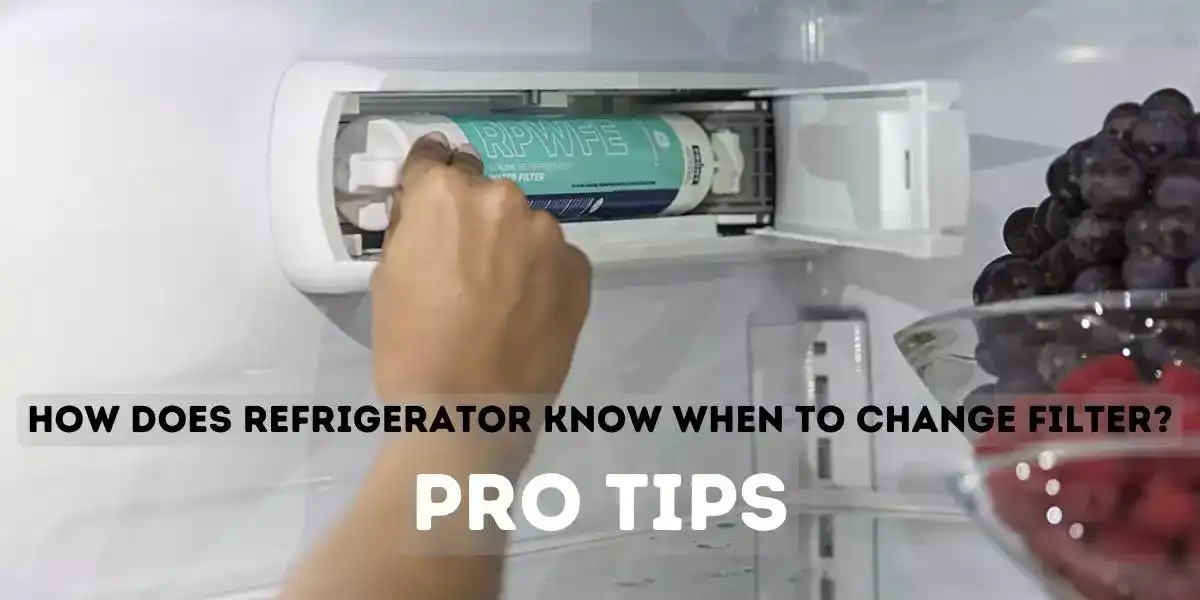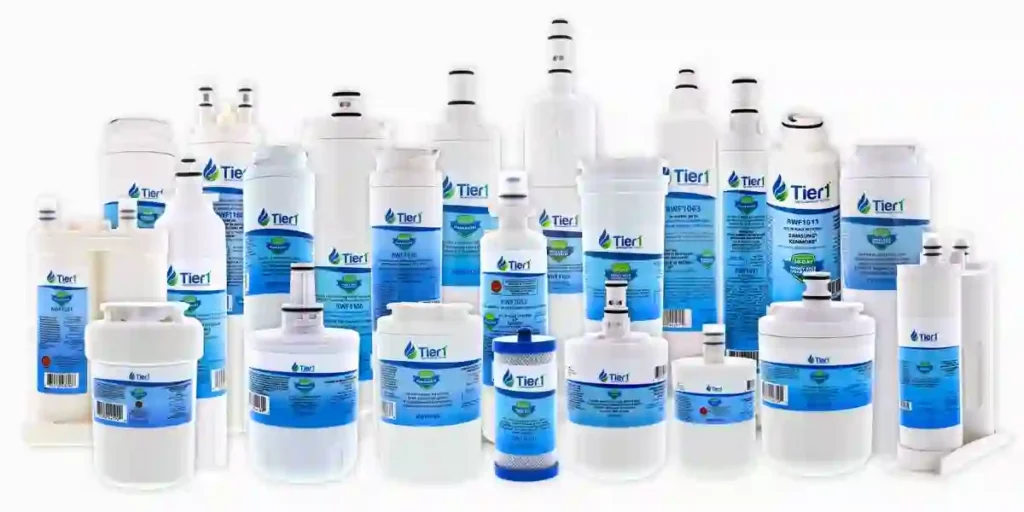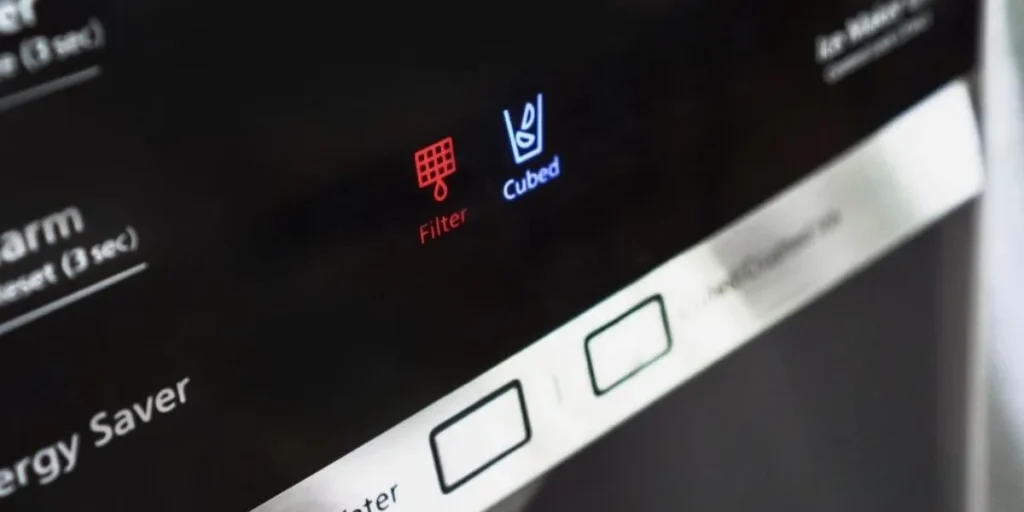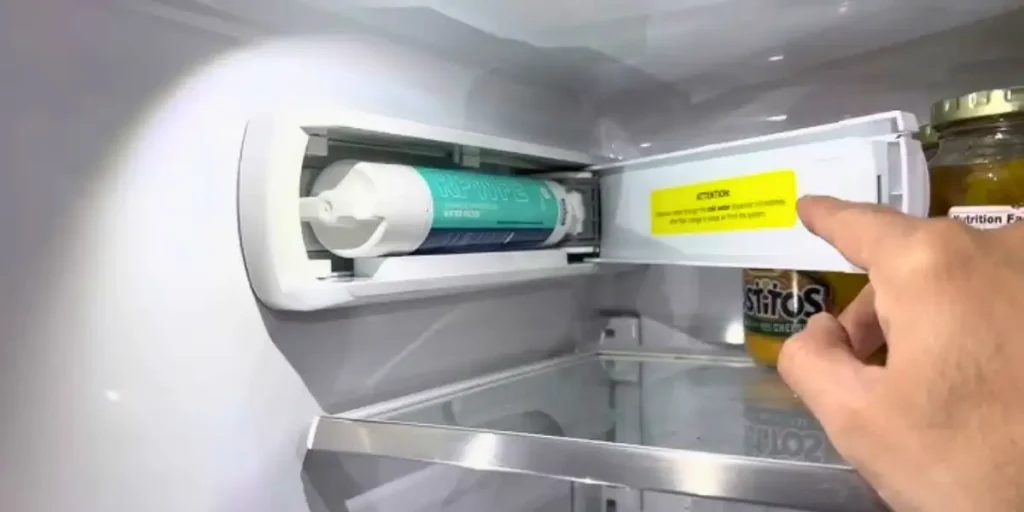
Ever wonder how your refrigerator always seems to know when it’s time for a new water filter? No, it’s not magic; it’s all about smart technology working behind the scenes. What’s the secret?
Let’s dive into the fascinating world of fridge filters and sensors that keep your water tasting fresh. Ready to be enlightened?
How Does a Refrigerator Know When to Change the Filter?
Refrigerators use various systems, such as timers or sensors, to monitor filter usage and water quality. When the filter reaches its limit, the refrigerator sends a notification.
Refrigerators use a variety of mechanisms to determine when it’s time to change the filter. Some systems are timer-based, meaning they track the time since the last filter change and send a notification after a set period, typically every six months.
Other refrigerators use flow sensor-based systems that measure the amount of water that has passed through the filter. When the volume of water reaches a certain limit, the refrigerator sends a filter change notification.
There are also quality sensor-based systems that monitor the quality of the filtered water. These systems can detect a decrease in water quality, which usually indicates that the filter is no longer effectively removing contaminants.
Lastly, some refrigerators have manual indicators that need to be reset after each filter change. These indicators don’t track time or water usage but serve as a reminder for users to change their filters regularly.
Regardless of the system used, it’s important to heed these notifications and change your refrigerator’s filter as recommended. This ensures that your refrigerator continues to provide clean, safe drinking water and operates at peak efficiency.
Types of Filters Used in Refrigerators

Mechanical Filters
Mechanical filters work like a sieve, trapping and removing physical particles from the water. They’re great at catching sediment and larger particles, making them a solid choice for basic filtration needs.
However, their filtering capabilities have limits. They can’t remove chemicals or dissolved substances, which means they might not be the best choice if your water has high levels of these contaminants.
Carbon Filters
Carbon filters use activated carbon to remove contaminants from water. They’re excellent at removing chlorine, which can affect the taste and smell of your water.
They’re also good at filtering out volatile organic compounds, which are chemicals that can evaporate into the air from water.
This makes carbon filters a popular choice for improving the taste of drinking water. However, they’re not effective against hard minerals or microbes.
So, if you have hard water or are concerned about bacteria, you might need a different type of filter.
Reverse Osmosis Filters
Reverse osmosis filters use a semi-permeable membrane to remove a wide range of contaminants from water. They’re highly effective at removing everything from heavy metals to certain types of bacteria.
This makes them a top choice for comprehensive water filtration. However, the filtration process is slow and can waste water.
So while they offer excellent filtration, they might not be the best choice if you’re concerned about water conservation.
Activated Carbon Filters
Activated carbon filters are the most common type of filter found in refrigerators. They are treated with oxygen to open up millions of tiny, highly absorbent pores that trap tiny microbes, odors, and volatile organic compounds (VOCs) in the water. Over time, the activated carbon filter will lose its ability to remove contaminants.
HEPA Filters
HEPA filters are another type of filter that can be found in some refrigerators. These filters are known for their ability to trap very small particles, making them a good choice for those who want to ensure their refrigerator air is as clean as possible.
Antimicrobial Filters
Antimicrobial filters are designed to prevent the growth of bacteria and other microorganisms. This can be particularly beneficial in a refrigerator, where food particles can often lead to the growth of bacteria.
Brand-Specific Filters
It’s also important to note that different refrigerator brands may use different types of filters.
For example, Frigidaire uses the Pure Source Ultra Water Filter, while Kenmore and Samsung refrigerators might use a Pureline Refrigerator Water Filter Replacement.
Always make sure to use the filter that is specifically designed for your refrigerator model for optimal performance.
How Filter Change Notifications Work?

Timer-Based Systems
Imagine a stopwatch that starts ticking the moment you install a new filter. That’s what timer-based systems do.
They keep track of the time since the last filter change and send a notification after a set period, usually six months. It’s simple and effective, but it doesn’t account for actual usage.
Flow Sensor-Based Systems
Flow sensor-based systems are like water meters for your refrigerator. They measure the amount of water that has passed through the filter.
When the water volume reaches a certain limit, the system sends an alert. This method is more accurate as it considers actual usage.
Quality Sensor-Based Systems
Quality sensor-based systems are the detectives of filter change notifications. They monitor the quality of filtered water and notify you when they detect a decrease in quality.
This means they can alert you to changes in your water supply that might require a filter change sooner than expected.
Manual Indicators
Manual indicators are like sticky notes on your fridge door. Some refrigerators have these indicators that need to be reset after each filter change. They don’t track time or water usage but serve as a reminder for you to change your filters regularly.
Basic Notifications
Basic notifications are the simplest form of change notifications. They don’t contain any resource data other than the ID of the resource that changed.
When a device receives a basic notification, it can use the ID to query the changed object. This type of system is commonly used in software applications, but it can also be applied to filter change notifications.
User-Generated Notifications
User-generated notifications are triggered by actions taken by the user. For example, if a user sets a reminder to change the filter after a certain period, the system will send a notification at the specified time.
System-Generated Notifications
System-generated notifications are triggered by the system itself. For instance, if the system detects that the filter is not working properly or if there’s a significant change in air or water quality, it will automatically send a notification.
Context-Generated Notifications
Context-generated notifications are based on specific conditions or contexts. For example, if the air quality index in your area drops significantly, your air purifier might send you a notification suggesting a filter change.
Smart Notifications
Smart notifications are advanced notifications that take into account various factors. They might consider your usage patterns, environmental conditions, and even predictive maintenance data to determine when a filter change is needed.
These systems use artificial intelligence and machine learning algorithms to provide more accurate and timely notifications.
Factors Influencing Filter Change Timelines
Frequency of Usage
The more you use a device with a filter, the more often you’ll need to change the filter. This is because the filter traps more particles as usage increases, which can cause it to become less effective over time.
Water Quality
The quality of your water can also affect how often you need to change your filter.
Hard Water
Hard water contains high levels of minerals like calcium and magnesium. These minerals can clog filters faster, requiring more frequent changes.
Contaminated Water
If your water is contaminated with pollutants or microorganisms, you’ll need to change your filter more often. This is because the filter has to work harder to remove these contaminants.
Type of Refrigerator
Different refrigerator models have different filter lifespans. Some models may require more frequent filter changes than others. Always check your refrigerator’s manual for specific information about filter changes.
Brand and Manufacturer Guidelines
Always follow the manufacturer’s recommendations for changing your filter. These guidelines are based on extensive testing and are designed to ensure the optimal performance of your device.
Environmental Considerations
Your local climate can affect the lifespan of your filter. For example, if you live in a hot and humid climate, you may need to change your filter more often.
Economic Factors
Higher-end filters may last longer but cost more. When choosing a filter, consider both its lifespan and its cost. Remember, investing in a good quality filter can save you money in the long run by reducing the need for frequent replacements.
Filter Quality
The quality of the filter itself can play a significant role in determining how often it needs to be changed. High-quality filters are typically designed to last longer and perform better over time.
Installation Process
The way a filter is installed can also affect its lifespan. If a filter is not properly installed, it may not work as effectively and could require more frequent changes.
Maintenance Practices
Regular maintenance of your device can help extend the life of your filters. This includes cleaning the device, checking for leaks, and ensuring all components are working properly.
User Habits
The habits of the user can also influence filter change timelines. For example, if a user tends to use a device heavily, the filter may need to be changed more frequently.
Is It Possible for a Refrigerator to Run Out of Freon If the Filter Is Not Changed?
A refrigerator’s freon levels can deplete if the filter is not changed regularly. It is crucial to monitor the freon levels to avoid problems like insufficient cooling or complete breakdown. Hence, understanding and knowing refrigerator freon levels is necessary to maintain its optimal functionality and prevent potential issues.
Consequences of Not Changing the Filter of Your Refrigerator

Bad Taste and Smell
An unchanged filter can lead to a bad taste and smell in your water and ice. This is due to the buildup of contaminants that the filter is no longer able to effectively remove1.
Dark, Cloudy, Strange-Textured, and Smelly Ice Cubes
If the filter isn’t changed regularly, the ice cubes produced by your refrigerator may become dark, and cloudy, have a strange texture, and smell bad. This is a clear sign that your water filter needs to be replaced.
Reduction in Water Flow
The water flow from your refrigerator can be reduced if the filter isn’t changed regularly. This is because as more contaminants get trapped in the filter, less water can pass through.
Little or No Ice Production
If the filter isn’t changed regularly, it can lead to little or no ice production. This is because a clogged filter can prevent water from reaching the ice maker.
Lessons Refrigerator’s Lifespan
Not changing your refrigerator filter can cause serious damage to your refrigerator. The contaminant buildup would eventually cause the system to malfunction, performing at a low flow and slow pace. This could lessen the lifespan of your refrigerator.
Health Problems
Not changing your refrigerator water filter can cause a variety of health problems. Traces of dangerous bacteria such as E. coli can sneak into your water supply. These pose a risk to your health.
Decreased Efficiency
Over time, the water flow from your refrigerator can decrease if the filter isn’t changed regularly. This is because as more and more contaminants get trapped in the filter, less and less water can pass through. This can result in a slower water flow and less efficient operation.
Increased Operating Costs
A clogged filter makes your refrigerator work harder. This increased strain on the appliance can lead to higher energy consumption, which in turn leads to increased operating costs.
So, while you might think you’re saving money by not changing the filter, you could be spending more on energy bills.
Void Warranty
Some manufacturers require regular filter changes as part of their warranty conditions. If you don’t change your filter as required, you could potentially void your warranty.
This means that if something goes wrong with your refrigerator, the manufacturer might not cover the repair costs.
FAQs
How accurate are the filter change indicators?
Generally accurate but can vary based on usage and water quality.
Can I reset the filter change notification?
Yes, usually after each filter change.
Does the brand of filter matter?
Yes, always use filters designed for your refrigerator model.
Is it necessary to use manufacturer-recommended filters?
Yes, for optimal performance and warranty validity.
Can ignoring the filter change notification harm my refrigerator?
Yes, it can lead to decreased efficiency and potential damage.
Conclusion
You don’t have to play guessing games with your fridge anymore! Modern refrigerators use smart sensors to monitor water flow and filter life.
When it’s time for a change, you’ll get a handy alert. So go ahead, enjoy that crystal-clear water and peace of mind.
